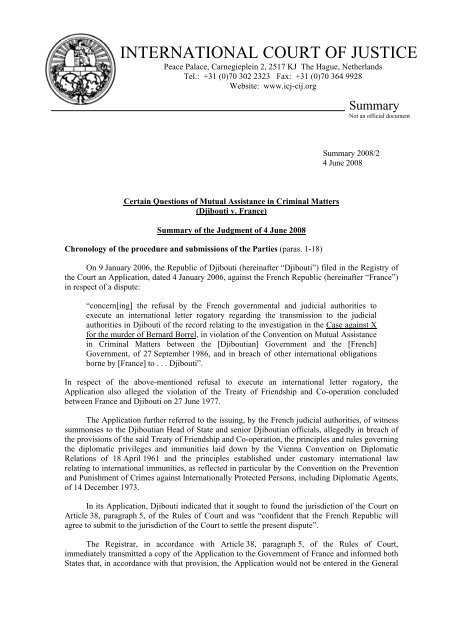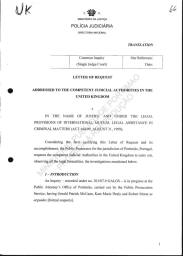The Function of Letters Rogatory in Criminal Investigations Across Borders
The Function of Letters Rogatory in Criminal Investigations Across Borders
Blog Article
The Duty of Letters Rogatory in International Law: Secret Insights
Letters rogatory offer as a crucial instrument in global legislation, promoting cross-border lawful aid by permitting jurisdictions to officially ask for proof and activities from one an additional. What effects might these difficulties have for future lawful proceedings?
Meaning of Letters Rogatory
In the realm of international law, letters rogatory function as formal demands provided by a court in one jurisdiction to seek support from a court in an additional territory. Letters rogatory. These requests are particularly considerable in cross-border legal process, where the enforcement of a court's order or the event of proof may be hindered as a result of administrative limitations

The process generally requires the requesting court to verbalize the specific information or action required from the international court, sticking to the legal methods and conventions established in between the jurisdictions entailed. When provided, the letters rogatory are transferred via diplomatic channels, which might consist of embassies or consular offices, to make certain that the demand is identified and acted upon by the international court. In general, letters rogatory exemplify the cooperative structure crucial for reliable worldwide lawful processes.
Historic Context
Although the method of letters rogatory has ancient origins, its formalization within the framework of worldwide legislation emerged considerably in the 20th century. Historically, such ask for judicial help were made use of in numerous legal customs, including Roman law, where they assisted in cross-border collaboration in legal issues. The idea got restored focus with the increase of globalization and the enhancing intricacy of global legal communications.
The mid-20th century saw the establishment of treaties and conventions that looked for to systematize the process of letters rogatory. Significantly, the 1970 Hague Convention on the Taking of Proof Abroad in Business or civil Matters supplied an organized approach, boosting the efficiency of these requests - Letters rogatory. This period marked a change from casual setups to a more organized structure, which attended to the obstacles postured by varying national legal systems
As states came to be much more interdependent, the need for reliable mechanisms to collect proof throughout borders emerged, strengthening the duty of letters rogatory in helping with international cooperation. Today, they stay a vital tool for obtaining proof and making certain that justice goes beyond nationwide borders, showing the evolving nature of global regulation in feedback to global obstacles.
Refine of Issuing Demands
The process of issuing letters rogatory typically includes a number of important steps developed to make certain that ask for judicial assistance are clear, particular, and compliant with both domestic and international lawful requirements. At first, a party looking for support needs to prepare an official demand that outlines the important realities of the case, the alleviation sought, and the certain proof or testament needed. This paper needs to be crafted with accuracy to satisfy the legal needs of the jurisdiction in which it will be sent.
Adhering to the prep work of the demand, it is sent to the proper authority, often a court or a designated governmental company. This authority assesses the request to guarantee check these guys out it sticks to legal standards and step-by-step norms. When approved, the request is sent to the international territory via diplomatic networks.
Upon invoice, the foreign court assesses the request's compliance with its local regulations and practices (Letters rogatory). If approved, it proceeds to implement the request, which might include the issuance of subpoenas or the collection of evidence. Throughout this procedure, maintaining clear communication in between the requesting and receiving jurisdictions is vital to guarantee successful collaboration and the fulfillment of the request
Obstacles and Limitations
Limitations and obstacles regularly occur in the process of performing letters rogatory, frequently stemming from varying lawful systems and treatments in between territories. One substantial obstacle is the differing standards of admissibility for evidence, which can lead to difficulties in the approval of documents asked for via letters rogatory. Furthermore, the lack of uniformity in lawful terminology and interpretations can create misunderstandings, complicating communication between courts in various moved here countries.
Moreover, delays prevail due to governmental procedures, as the demand may require to travel through multiple layers of legal authorities prior to it is met. In some instances, the asked for territory might lack the necessary resources or desire to work together, additionally preventing the procedure. Language obstacles also contribute to challenges, as precise translation of legal files is crucial for making certain that the intended message is shared without distortion.
Lastly, sovereignty issues may emerge, as some states are unwilling to abide by requests that they view as infringing upon their lawful freedom. These obstacles highlight the complexities fundamental in making use of letters rogatory, requiring greater harmonization and cooperation amongst international legal systems to improve their performance.

Impact on International Participation
Identifying the relevance of letters rogatory in promoting international participation is essential, as these requests facilitate cross-border lawful support and promote collective initiatives in criminal and civil matters. By making it possible for one jurisdiction to officially ask for assistance from visit homepage one more, letters rogatory develop a structured lawful structure that boosts the effectiveness of global communication between judicial authorities.
Making use of letters rogatory helps to establish common trust fund and respect amongst nations, which is important in a significantly interconnected globe. They offer as a system not only for gathering proof but additionally for making sure that lawful procedures are upheld across boundaries. This is especially important in combating multinational crime, where the inability to safeguard cooperation can threaten justice.
Additionally, the dependence on letters rogatory can improve complicated lawful procedures, decreasing hold-ups and uncertainties in global investigations. The procedural safeguards integral in this procedure add to the security of individual civil liberties while assisting in teamwork amongst states. Ultimately, the impact of letters rogatory on global participation highlights their duty as crucial devices in the promotion of justice, cultivating a collaborative spirit that transcends legal systems and nationwide borders.
Conclusion
In final thought, letters rogatory offer as an essential tool in international law, facilitating cross-border legal assistance and cooperation. The continued advancement of these devices is crucial for boosting the performance of international lawful processes, ultimately promoting stronger partnership in both criminal and civil matters across jurisdictions.
Letters rogatory offer as an essential tool in global regulation, facilitating cross-border lawful support by enabling territories to formally request proof and activities from one another.The procedure typically requires the requesting court to articulate the particular details or activity required from the foreign court, adhering to the lawful protocols and conventions developed between the territories involved. Historically, such requests for judicial aid were used in different lawful customs, consisting of Roman law, where they helped with cross-border collaboration in lawful issues.The procedure of issuing letters rogatory typically entails numerous critical actions designed to make sure that demands for judicial support are clear, certain, and certified with both domestic and international lawful requirements.Moreover, delays are typical due to administrative procedures, as the demand may need to pass through multiple layers of lawful authorities before it is met.
Report this page